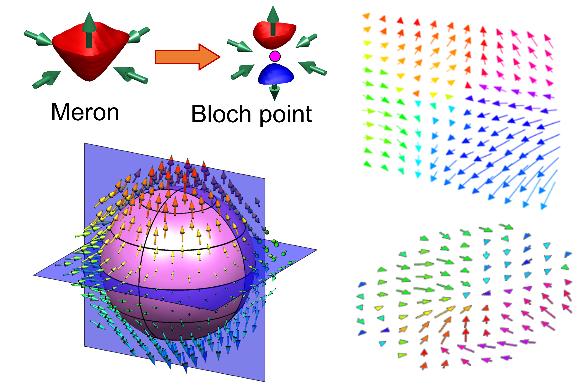
A Bloch point is a singular point around which the field vectors are oriented in nearly all directions. In magnetics, it is the natural link between classical and quantum magnetism and has not been directly observed. In ferroelectrics, it has only been predicted in a few cases.
Researchers from the Institute of Metal Research (IMR) of the Chinese Academy of Sciences (CAS) and collaborators from the Institute of Physics of CAS have directly observed polar Bloch points in strained ferroelectric films.
This work was published in Nature Communications.
Based on their previous work on the polar meron lattice, the researchers considered the model of a tensile-strained ultrathin ferroelectric PbTiO3 film sandwiched by symmetric electrodes in phase-field simulations and found that the merons transform into Bloch points with the increase of the electrode thickness.
Then, a trilayer SrRuO3/PbTiO3/SrRuO3 film was grown on the SmScO3 substrate by the pulsed laser deposition, and aberration-corrected scanning transmission electron microscopic imaging was used to observe the polarization configuration of polar Bloch points. Further phase-field simulations predicted that a region of negative capacitance there exists around each polar Bloch point.
The discovery of polar Bloch points expands the assembly of topological ferroelectric domain structures and implies novel applications in future integrated circuits and low-power electronic devices.
The work was supported by the National Natural Science Foundation of China, the Guangdong Provincial Quantum Science Strategic Initiative, and the Youth Innovation Promotion Association of CAS, etc.

The transition from a meron to a Bloch point (left) and the atomic scale STEM image (right) (Image by IMR)

86-10-68597521 (day)
86-10-68597289 (night)

52 Sanlihe Rd., Xicheng District,
Beijing, China (100864)

